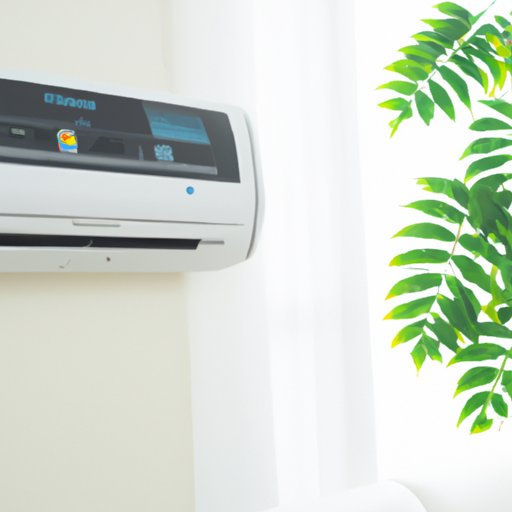Introduction
When planning a vacation, many homeowners are faced with the dilemma of whether to leave their air conditioner (AC) on or turn it off. Doing so can have both positive and negative impacts, depending on a variety of factors. In this article, we’ll explore the pros and cons of leaving your AC on while on vacation, as well as strategies for minimizing energy usage and costs.

Pros and Cons of Leaving the AC On
Before making a decision about whether or not to leave your AC on while on vacation, it’s important to understand the potential benefits and drawbacks.
Financial Impact
The primary concern for most homeowners is the financial impact of leaving the AC on while away. Depending on the length of the vacation, the amount of time the AC is running, and the efficiency of the system, leaving the AC on can add significantly to your electricity bill. However, turning the AC off completely during an extended absence can also result in higher costs if you have to replace any furniture, flooring, or belongings damaged by high humidity.
Protection from Damage and Pests
Another factor to consider is the potential damage caused by high humidity levels. Humidity can damage furniture and cause mold and mildew to form on walls and ceilings. It can also attract pests like cockroaches and other insects. Keeping the AC on can help reduce humidity levels and protect your home from these issues.
Automating Settings for Efficiency and Savings
If you decide to keep the AC running while on vacation, one way to save money is to automate the settings. Many newer thermostats allow you to program specific temperatures for different times of day, so you can set the temperature to be slightly higher during the day when no one is home. This will help minimize energy consumption while still protecting your home from the effects of high humidity.
Minimizing Energy Usage and Costs
Whether you choose to leave the AC on or turn it off while on vacation, there are several strategies you can use to minimize energy usage and costs.
Tips for Reducing Energy Usage
One of the easiest ways to reduce energy usage is to maintain your AC unit regularly. Make sure to regularly change filters and check for any signs of wear and tear. Additionally, you can use ceiling fans and other methods to help circulate air throughout the house. This will help reduce the amount of time the AC is running.
Strategies for Maintaining Proper Humidity Levels
If you choose to turn the AC off while on vacation, there are several strategies you can use to maintain proper humidity levels. Investing in a dehumidifier can help reduce moisture in the air and prevent mold and mildew from forming. Additionally, you can open windows and doors when the weather permits, which will help to circulate air throughout the house.

Dangers of Returning to a Hot Home After an Extended Vacation
Finally, another factor to consider is the potential danger of returning to a hot home after an extended vacation. If you turn the AC off while away, it may take several hours for the temperature to drop back to a comfortable level once you return. This could be dangerous, especially in extreme climates where the temperature inside the house could become dangerously high.
Conclusion
When deciding whether to leave your AC on while on vacation, it’s important to weigh the pros and cons carefully. On the one hand, leaving the AC on can lead to higher energy bills and potential damage to belongings. On the other hand, turning the AC off could result in higher costs due to damage from high humidity levels. Fortunately, there are strategies homeowners can use to minimize energy usage and costs, such as automating settings and using dehumidifiers. Ultimately, the best decision will depend on the individual homeowner’s circumstances.
Summary of Pros and Cons
In summary, leaving the AC on while on vacation can help protect your home from damage and pests, but it can also lead to higher energy bills. Turning the AC off can save money in the short term, but can also result in costly damage due to high humidity levels.
Recommendations for Making Smart Decisions
Ultimately, the decision of whether or not to leave the AC on while on vacation should be based on a variety of factors, including the length of the trip, the temperature outside, and the efficiency of the AC unit. Homeowners should also consider strategies for minimizing energy usage and costs, such as automating settings and using dehumidifiers. By weighing these factors carefully, homeowners can make an informed decision about whether to leave the AC on or turn it off while away.
(Note: Is this article not meeting your expectations? Do you have knowledge or insights to share? Unlock new opportunities and expand your reach by joining our authors team. Click Registration to join us and share your expertise with our readers.)
